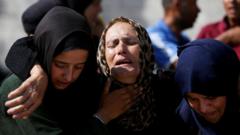After enduring military strikes, Iran is redirecting its foreign policy towards strengthening ties with the BRICS group, which includes key emerging economies. As debates on unified responses to Iran's situation unfold, internal divisions within BRICS could affect its cohesion and effectiveness.
Iran Enhances Alliances in BRICS Amidst International Isolation

Iran Enhances Alliances in BRICS Amidst International Isolation
As Iran faces heightened tensions over military strikes, it seeks support from the BRICS nations to redefine global alignments.
Battered by 12 days of conflict and standing largely isolated in the Middle East, Iran is now looking beyond its regional adversaries for support. The Islamic Republic will participate in a two-day BRICS meeting in Rio de Janeiro beginning Sunday, marking its debut in this important coalition comprising Brazil, Russia, India, China, South Africa, and other emerging economies. This summit represents a crucial opportunity for Iran to project a sense of camaraderie among nations, even as it grapples with ongoing sanctions and the looming threat of military action over its contentious nuclear activities.
The recent military assaults by Israel and the United States on Iranian positions have sparked international concern. Following these events, the BRICS coalition expressed its "grave concern" and described the actions as violations of international law and the United Nations Charter. However, the group's unity faced scrutiny, as its members refrained from directly condemning either Israel or the U.S., reflecting differing viewpoints among the countries.
As tensions rise, the true test for BRICS will lie in its ability to maintain a cohesive front amid varying perspectives on how to address the conflict involving Iran. Oliver Stuenkel, a Brazilian scholar focused on BRICS dynamics, suggested, "There is no alignment whatsoever on Iran," indicating that the current public stance of the coalition is a compromise, avoiding a more contentious position.
With relations between Iran and Western powers remaining fraught, the upcoming BRICS summit presents an opportunity for Iran to reaffirm its ties with a group that aspires to challenge the existing global power structure. Yet, the effectiveness of this alliance in fostering a coordinated response to the challenges facing Iran—and its implications for broader international diplomacy—remains uncertain.
The recent military assaults by Israel and the United States on Iranian positions have sparked international concern. Following these events, the BRICS coalition expressed its "grave concern" and described the actions as violations of international law and the United Nations Charter. However, the group's unity faced scrutiny, as its members refrained from directly condemning either Israel or the U.S., reflecting differing viewpoints among the countries.
As tensions rise, the true test for BRICS will lie in its ability to maintain a cohesive front amid varying perspectives on how to address the conflict involving Iran. Oliver Stuenkel, a Brazilian scholar focused on BRICS dynamics, suggested, "There is no alignment whatsoever on Iran," indicating that the current public stance of the coalition is a compromise, avoiding a more contentious position.
With relations between Iran and Western powers remaining fraught, the upcoming BRICS summit presents an opportunity for Iran to reaffirm its ties with a group that aspires to challenge the existing global power structure. Yet, the effectiveness of this alliance in fostering a coordinated response to the challenges facing Iran—and its implications for broader international diplomacy—remains uncertain.



















